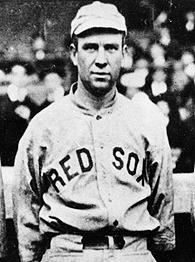 Tristam "Tris" Speaker was one of the greatest Red Sox of all-time, but sadly not many modern day Red Sox fans know him, and those that do, know little about him. No outfielder other than Ty Cobb was a better ballplayer than Speaker was in the early 1900s to the 1920s. Speaker is the definition of an old-time baseball player. He could hit well, he could run well, and he was the finest defensive outfielder of his generation. Speaker, who was nicknamed the "Grey Eagle", was born in Hubbard, Texas on August 4, 1888. Speaker played major league ball for 22 seasons, 9 of those with the Boston Red Sox. Speaker later played for the Cleveland Indians for 11 seasons, managing the team for nine of those, the Washington Senators for one and the Philadelphia Athletics for one. Speaker's lifetime batting average, .345, is sixth best all-time and his 3,514 career hits is fifth best all-time. Speaker is one of baseball's greatest players because of his success with the Red Sox, his hitting ability, and his amazing fielding skills. Speaker represented exactly what a star baseball player of his generation hoped to be.
Tristam "Tris" Speaker was one of the greatest Red Sox of all-time, but sadly not many modern day Red Sox fans know him, and those that do, know little about him. No outfielder other than Ty Cobb was a better ballplayer than Speaker was in the early 1900s to the 1920s. Speaker is the definition of an old-time baseball player. He could hit well, he could run well, and he was the finest defensive outfielder of his generation. Speaker, who was nicknamed the "Grey Eagle", was born in Hubbard, Texas on August 4, 1888. Speaker played major league ball for 22 seasons, 9 of those with the Boston Red Sox. Speaker later played for the Cleveland Indians for 11 seasons, managing the team for nine of those, the Washington Senators for one and the Philadelphia Athletics for one. Speaker's lifetime batting average, .345, is sixth best all-time and his 3,514 career hits is fifth best all-time. Speaker is one of baseball's greatest players because of his success with the Red Sox, his hitting ability, and his amazing fielding skills. Speaker represented exactly what a star baseball player of his generation hoped to be.Speaker was a key ingredient on the Red Sox when the team won the World Series in both 1912 and 1915. The Red Sox teams of 1912-15, were arguably the best Sox teams of all-time, with just one poor season in 1913. The Sox won over 100 games in both years, something that no Sox did again until 1946, and none have done since '46. The 1912 season was also the best statistical season for Speaker. At just 24, the Texan hit .383 (second best of his career, he hit .386 in 1916), with a career best 222 hits, 53 doubles, 10 home runs, with a .464 OBP and a .567 SLG percentage. Speaker would later manage the Cleveland Indians to a World Series win in 1920, proving he could be successful in that role as well.
Speaker's hitting ability led the team to those titles. He was not a power hitter, but no hitters were power hitters when he played. The skill that was valued most during Speaker's generation was the ability to hit for contact, to place the ball where the fielders were not playing. Speaker could do this with the best hitters and his 3,514 career hits proves that. With his speed, he turned many of those well placed hits into extra bases. His greatest offensive skill was hitting doubles, leading the league eight times and still holding the career record for most doubles with 793.
"The Grey Eagle" was a player who epitomized what was expected of a star ballplayer in the early 1900s. His combination of speed, defense, and hitting made him an all around player, while his toughness and willing to get dirty made him a fan favorite. He was a "Boston Dirt Dawg" before the term was popularlized.
Speaker's ability is exemplified through an unassisted double play during the 1910 season. Speaker caught a low line drive in centerfield and was fast enough to beat the runner to second base for the double play. Speaker holds the career record for most assists with 450.
As his teammate, "Smokey" Joe Wood said, "He simply did everything well. You couldn't ask for a better all-around player."
Speaker became the seventh ever player inducted into the Hall of Fame in 1937, with the phrase, "the greatest centerfielder of his day", inscribed on his plaque.

No comments:
Post a Comment